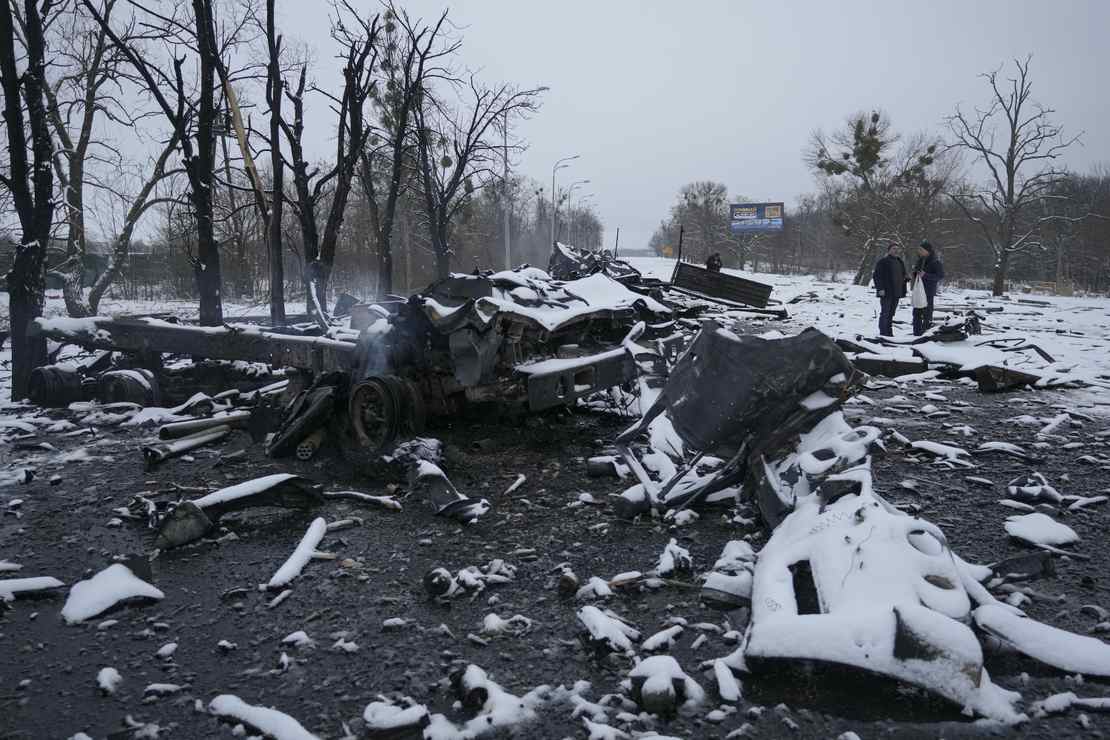
It’s their second in a week. On February 28, Maj. Gen. Andrei Sukhovetsky was killed by a sniper. He was the commander of Russia’s 7th Airborne Division and deputy commander of the 41st Army.
Today Ukrainian forces killed the 41st Army’s chief of staff.
A caution on the name here, which may sound familiar. This isn’t the Gen. Gerasimov who serves as military chief of staff to Putin and was recently seen meeting with him on camera. That’s Valery Gerasimov, who’s almost certainly nowhere near the front lines or even inside Ukraine. The KIA is Vitaly Gerasimov, still a big fish:
Major General Vitaliy Gerasimov, the chief of staff with Russia’s 41st Combined Arms Army, has been eliminated by Ukraine’s military intelligence operators.
I still don’t get it what Russians are hoping for in this war. pic.twitter.com/LBWPYpAFMN— Illia Ponomarenko 🇺🇦 (@IAPonomarenko) March 7, 2022
The 41st Army is being gradually decapitated.
It’s above my pay grade to explain what Russian generals are doing so close to the front lines that they’re in range of sniper fire but presumably it’s a function of the army’s dysfunction. With morale low due to supply issues and reports of tactical confusion in the field, it’s logical that senior officers would put themselves at greater risk to try to impose order in the ranks. The Russian military desperately needs leadership right now. Perhaps Gerasimov stepped up and met his end as a result.
I’m also curious as to how Ukrainian snipers are able to identify generals at a distance. (One report claimed that Sukhovetsky was picked off from around a mile away.) Are western intel agencies feeding information to the Ukrainians about the movements of Russian officers? That would be a high-risk, high-reward form of escalation, if so. If Putin finds out, there’s no telling how he’d react. But further demoralizing the already demoralized Russian military is Ukraine’s most urgent task at the moment and killing a general is an efficient way to go about it.
I think it’s significant too that Gerasimov was killed near Kharkiv. Because it’s close to the Russian border and has many ethnic Russians among its population, Kharkiv was a city which Putin probably assumed would switch sides quickly once Russia invaded. If the military was going to receive the “greeted as liberators” treatment anywhere in Ukraine, Kharkiv seemed like a likely possibility. Instead, Russian generals are dying on its soil.
Putin’s propaganda about Russians and Ukrainians being “one people” is dying there too. Here’s what Kharkiv’s gotten from the Russian military for refusing to accept its reabsorption by Russia:
An Al Jazeera team was able to enter the devastated city of Kharkiv in Ukraine after Russia announced a pause in fighting to allow people to leave.
Reporter @stratfordch was shocked by what he saw ⤵️ pic.twitter.com/jgNJFLjk08
— Al Jazeera English (@AJEnglish) March 7, 2022
Meanwhile, in Moscow, Putin made a curious announcement today:
“Conscripted soldiers are not participating and will not participate in the fighting. There will not be an additional conscription of reservists either,” Putin said in a televised address marking International Women’s Day on March 8.
“The fixed objectives are only carried out by professional servicemen. I am sure they are guaranteeing security and peace for the Russian people in an effective manner,” Putin added.
READ RELATED: Ohbliv Height, Weight, Net Worth, Age, Birthday, Wikipedia, Who, Nationality, Biography
Conscripts certainly are fighting in Ukraine. But Putin pledging not to send more may be a hint that he’s rattled by some of the demonstrations that were held this weekend and worried about domestic reaction to an endless bloodbath across the border. Russian propaganda can pacify the public for only so long before the state has to explain to worried mothers why their sons haven’t returned from their tour of duty yet.
If Putin’s serious about not tapping Russia’s manpower, though, how will he continue to fight this war? Or is his pledge just nonsense aimed at boosting public confidence in the skill of the military — “professional servicemen” — amid rumors of unexpected difficulties in subduing Ukraine?
#Ukraine: We present some exclusive recent footage from the eyes of the Bayraktar TB2 drone in the hands of the Ukrainian military.
A 9K317 Buk-M2 TELAR, part of the infamous convoy, completely destroyed. pic.twitter.com/PUiWkeOPwm
— 🇺🇦 Ukraine Weapons Tracker (@UAWeapons) March 7, 2022
Maybe he’s concerned that reports of heavy losses are making their way into Russia and is eager to put people at ease. Surely he wouldn’t rule out calling up conscripts and reservists if those reports were true, right?
Meanwhile, some of the cities that Russia “controls” still aren’t really under control:
occupied Nova Kakhovka today pic.twitter.com/sUW9N9jpbH
— DZENGA (@grimcultzero) March 6, 2022
Protests in Kherson. The Rosgvardia troops appear to be outnumbered. https://t.co/JNYI4PkHYF pic.twitter.com/5vtKPTbE1P
— Rob Lee (@RALee85) March 7, 2022
A large occupation force might be able to pacify the locals through intimidation. How does Russia pacify them without one?
I’ll leave you with one more detail from the killing of Gerasimov. How did knowledge of his death become public so quickly? Answer: Because Russia’s logistical quagmire extends even to communications with HQ.
This is not the worst part. In the phone call in which the FSB officer assigned to the 41st Army reports the death to his boss in Tula, he says they’ve lost all secure communications. Thus the phone call using a local sim card. Thus the intercept. pic.twitter.com/cgHHo7VaRi
— Christo Grozev (@christogrozev) March 7, 2022
Source:






